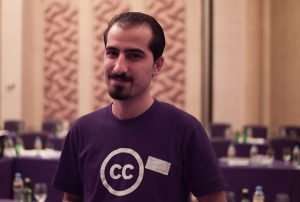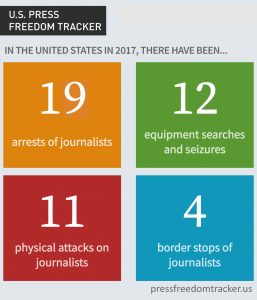2 Aug 2017 | Index in the Press
Stressing that “constant vigilance and an honest accounting of the country’s track record on press freedom are essential,” a coalition of press freedom groups has launched a first-of-its-kind website to track problems faced by reporters on the job in the United States. Read the full article
2 Aug 2017 | Index in the Press
A Syrian internet freedom activist was executed soon after he disappeared from prison in late 2015, his wife and supporters say they have learned. Bassel Khartabil’s wife said he was killed in October 2015 after receiving a death sentence. Read the full article
2 Aug 2017 | Campaigns -- Featured, Statements, Syria
[vc_row][vc_column][vc_column_text]

Bassel Khartabil (Photo: Courtesy MIT Media Lab)
The family of Bassel Khartabil, a Syrian-Palestinian software engineer and free speech activist, confirmed that he had been subjected to an extrajudicial execution in October 2015. The undersigned human rights organisations condemn the extrajudicial execution of Khartabil and call for an investigation into the circumstances surrounding his death.
On 1 August 2017, Noura Ghazi Safadi, Khartabil’s wife, announced on Facebook that her husband has been killed. She wrote: “Words are difficult to come by while I am about to announce, on behalf of Bassel’s family and mine, the confirmation of the death sentence and execution of my husband Bassel Khartabil Safadi. He was executed just days after he was taken from Adra prison in October 2015. This is the end that suits a hero like him.”
On 15 March 2012, Military Intelligence arrested Bassel Khartabil and held incommunicado for eight months before moving him to Adra prison in Damascus in December 2012. During this time he was subjected to torture and other ill-treatment. He remained in Adra prison until 3 October 2015, when he managed to inform his family that he was being transferred to an undisclosed location. That was the last time his family heard from him.
His family subsequently received unconfirmed information that he may have been transferred to the military-run field court inside the Military Police base in Qaboun in Damascus. These courts are notorious for conducting closed-door proceedings that do not meet minimum international standards for a fair trial.
Before his arrest, Bassel Khartabil used his technical expertise to help advance freedom of speech and access to information via the internet. He has won many awards, including the 2013 Index on Censorship Digital Freedom Award for using technology to promote an open and free internet, and was named one of Foreign Policy magazine’s Top 100 Global Thinkers of 2012 “for insisting, against all odds, on a peaceful Syrian revolution.”
Since his detention, human rights groups at a national, regional and international level campaigned for his immediate and unconditional release. On 21 April 2015, the United Nations Working Group on Arbitrary Detention declared his detention a violation of the International Covenant on Civil and Political Rights, and called for his release, yet the Syrian authorities still refused to free him.
The signatory organizations express the deepest sorrow at the death of Bassel Khartabil and believe that his arrest and subsequent execution are a direct result of his human rights work and his efforts to promote freedom of speech and access to information.
We urge the Syrian authorities to:
- Immediately disclose the circumstances of the execution of Bassel Khartabil;
- End extrajudicial executions, enforced disappearance, arbitrary arrests, and torture and other ill-treatment;
- Release all detainees in Syria held for peacefully exercising their legitimate rights to freedom of expression and association.
Signed:
1. Access Now
2. Amnesty International (AI)
3. Arab Digital Expression Foundation (ADEF)
4. Arabic Network for Human Rights Information (ANHRI)
5. Article 19
6. Association for Progressive Communications (APC)
7. Cairo Institute for Human Rights Studies (CIHRS)
8. CIVICUS: World Alliance for Citizen Participation
9. Electronic Frontier Foundation (EFF)
10. English PEN
11. Euromed Rights
12. Front Line Defenders (FLD)
13. FIDH, within the framework of the Observatory for the Protection of Human Rights Defenders
14. Gulf Centre for Human Rights (GCHR)
15. Hivos International
16. Index on Censorship
17. Iraqi Network for Social Media (INSM)
18. Lawyers’ Rights Watch Canada (LRWC)
19. Maharat Foundation
20. Metro Centre to Defend Journalists in Iraqi Kurdistan
21. Palestinian Center for Development and Media Freedoms (MADA)
22. PAX for Peace
23. PEN International
24. Reporters without Borders (RSF)
25. Sisters’ Arab Forum for Human Rights (SAF)
26. SKeyes Center for Media and Cultural Freedom
27. Social Media Exchange (SMEX)
28. Syrian Centre for Democracy and Civil Rights
29. Syrian Center For Legal Studies and Researches
30. Syrian Center for Media and Freedom of Expression (SCM)
31. Syrians for Truth and Justice (STJ)
32. Syrian Network for Human Rights (SNHR)
33. Vigilance for Democracy and the Civic State
34. World Organisation Against Torture (OMCT), within the framework of the Observatory for the Protection of Human Rights Defenders[/vc_column_text][/vc_column][/vc_row][vc_row][vc_column][vc_basic_grid post_type=”post” max_items=”12″ style=”load-more” items_per_page=”4″ element_width=”6″ grid_id=”vc_gid:1501752858054-88ccde4a-8e21-0″ taxonomies=”5407″][/vc_column][/vc_row]
2 Aug 2017 | Campaigns, Campaigns -- Featured, Media Freedom, media freedom featured
[vc_row][vc_column][vc_column_text]

US Press Freedom Tracker
Index on Censorship joined more than 20 press freedom organisations announcing the launch today of the U.S. Press Freedom Tracker, a new nonpartisan website dedicated to documenting press freedom abuses across the United States.
In recent months, journalists have been charged with crimes while covering protests in Washington D.C. and North Dakota; stopped at the border and subjected to searches of their electronic devices; and physically assaulted, in one case by a congressional candidate. Data collected on the U.S. Press Freedom Tracker shows that 19 journalists have been arrested in the course of their work in 2017 and that at least 10 reporters are currently facing charges. In 2017 at least four journalists have been stopped at the border and 11 have faced physical attacks, according to the tracker. These numbers may increase as we receive new information.
“While the focus has been on the Trump administration’s relationship with the press, American journalists have encountered more widespread obstacles to reporting — from violent protesters to police harassment — across the country as we detailed in our US report, researched and compiled with the methodology we developed for Mapping Media Freedom, our three-year-old database monitoring press freedom violations in 42 European area countries,” Melody Patry, head of advocacy at Index on Censorship, said.
“The United States has some of the strongest legal protections for press freedom in the world and a robust and varied media landscape, but this cannot be taken for granted. Open hostility, threats of leak prosecutions, and arrests have created a precarious situation for journalists,” said Alex Ellerbeck, senior research associate for the U.S. at the Committee to Protect Journalists and chair of the steering committee for the U.S. Press Freedom Tracker. “A full and honest accounting of challenges to press freedom in this country is sorely needed.”
The U.S. Press Freedom Tracker collects data based on news reports and tips submitted by journalists, professional organisations, and press freedom organisations. The coalition behind the tracker will use the research in letters, legal briefs, and advocacy campaigns.
“With the Trump administration ramping up its war on journalism, this initiative could not come at a more important time,” said Trevor Timm, executive director of the Freedom of the Press Foundation. “We hope it will be vital to highlighting the threats to press freedom in the U.S. and the important work journalists do to hold the government accountable.”
About the U.S. Press Freedom Tracker
Led by the Committee to Protect Journalists and Freedom of the Press Foundation, the site will serve as a central repository for data at a time when journalists in the U.S. are facing increased hostility. Freedom of the Press Foundation is leading the day-to-day operations of the U.S. Press Freedom Tracker, with its senior reporter, Peter Sterne, serving as the managing editor. The Committee to Protect Journalists is providing the initial funding and chairing the steering committee. The steering committee also includes representatives from the Reporters Committee for Freedom of the Press, the Knight Institute at Columbia University, Reporters Without Borders and Index on Censorship. A full list of partners is on the website.[/vc_column_text][/vc_column][/vc_row][vc_row][vc_column][vc_basic_grid post_type=”post” max_items=”12″ style=”load-more” items_per_page=”4″ element_width=”6″ grid_id=”vc_gid:1501680559388-7ab4706a-4916-9″ taxonomies=”8996″][/vc_column][/vc_row]

